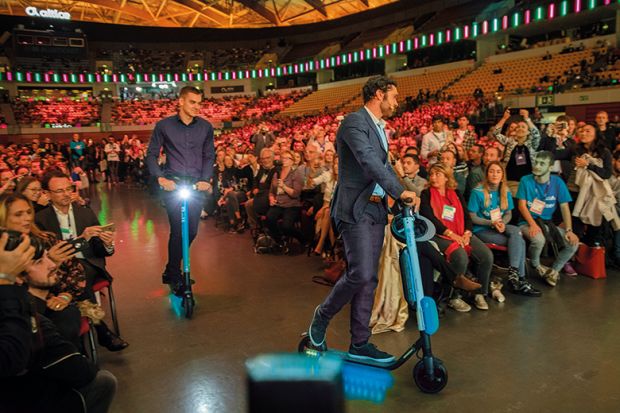From literature to manufacturing, crisis and creativity often go hand in hand. The pandemic has proved no exception. As the world sickened in 2020, innovative young technology companies put doctors’ surgeries online, digitalised parliaments and gathered public opinion. Journalists rushed to cover how start-ups were improving medical supply chains, bolstering social care and greening urban spaces.
Even as governments leaned on big technology companies to manage the crisis, public funding and venture capital began to be channelled towards start-ups addressing both immediate pressing public needs and longer-term recovery. A notable feature of these start-ups is their relationship to academic ecosystems.
University spin-offs are nothing new. Almost 1,000 were launched in the UK alone between 1998 and 2018. Globally, they have emerged across virtually all fields, from biotechnology to social networking and dating. But Covid, geopolitical megatrends and the mission orientation of modern university students all mean that we may now be entering an era of university spin-offs focused concertedly on what is known as public-purpose tech (PPT).
PPT may be best defined by its intentions and outcomes – serving a major public need rather than a specific customer looking for a specific product. That often (though not always) makes governments the de facto customer. Good examples include the University of Iceland’s Carbfix, which develops carbon storage technology; Imperial College London’s Recycleye, which is building AI for recycling; and the University of Florence’s Ecodrone, which is developing drones for planting new forests.
Funding is growing, particularly in areas now considered mission critical to society, such as decarbonisation and mobility infrastructure. For instance, Commonwealth Fusion, a Massachusetts Institute of Technology spin-off focused on nuclear fusion, raised $1.8 billion (£1.4 billion) last year. Chainalysis, tackling blockchain fraud, raised $200 million.
Silicon Valley often perpetuates the idea that technology alone can solve real-world problems. PPTs acknowledge that technology is only one part of the answer to addressing major public problems, alongside powerful policy, cultural and social levers.
This complexity and multidisciplinarity make universities a natural launchpad for PPT. But to launch successful companies, even universities must go beyond their comfort zones. When the transfer of knowledge and technology out of universities is discussed, the focus is often on natural, computer or engineering sciences. But PPT start-ups almost always require a greater disciplinary range than this: from an understanding of how public policy gets made to how citizens interact with government and the challenges of travelling around a specific local area.
Rural Senses, for example, was co-founded by an engineer and an international development expert at the University of Cambridge, bringing together the distinctive blend of expertise required to embed high-quality innovation in context-sensitive evaluation processes.
Beyond supplying expertise, universities can help to create the conditions for trust in PPT. A crisis of trust in institutions has long been stirring across democracies, and digital technologies increasingly evoke fears, too. A lack of accountability among start-ups working with vulnerable populations could amplify the crisis, as demonstrated by the story of how pay-as-you-go consumer financing of solar power in African villages proved unintentionally exploitative of poor communities. Proximity to research and debate on responsible technology and technology policy may help university-linked PPTs overcome public cynicism.
E-scooter companies, for example, produce outsized greenhouse emissions because of the materials in their scooters, and the need for frequent collection, maintenance and redistribution of vehicles. Based on research, Superpedestrian, an e-scooter spin-off of the MIT Senseable Cities Lab, developed a network of sensors, micro-computers and AI to allow e-scooters to self-detect problems and respond, extending their lifecycle and reducing the need for daily collections.
However, if we are to stimulate more university-born PPT, particularly in the UK and Europe, there are structural barriers to overcome. First, collaboration between technical and non-technical disciplines must be nurtured. Students and researchers often find entrepreneurial opportunities around academic departments rather than within them. While formal structures are emerging to enable cross-disciplinary innovation, such as the King’s Entrepreneurship Lab, they remain rare in the UK.
Second, questions over intellectual property rights and equity-sharing remain. This is particularly true for academic spinouts, where the university is often a significant shareholder from the get-go. This can leave founders with little control of the company after subsequent rounds of dilutive funding or little room for other investors later on.
Research shows PPT to be dominated by venture-backed models. But there is an emerging discussion about whether this is the most appropriate kind of financing for companies seeking to effect big public change. Universities have a role to play here, too. Projects such as Exit to Community (E2C), at the Media Enterprise Design Lab at the University of Colorado Boulder, are developing new ownership and investment models to address these systemic issues.
As PPT start-ups increasingly turn their attention away from Covid and towards long-term needs, from climate adaptation for local communities to eradicating diseases, they will require a mature appreciation of the role of public policy, culture and technology to enable regeneration. Universities are uniquely placed to help develop the operating system behind all these efforts.
Tanya Filer is founder and CEO of StateUp and founder of the Digital State Project at the Bennett Institute for Public Policy, University of Cambridge.
Register to continue
Why register?
- Registration is free and only takes a moment
- Once registered, you can read 3 articles a month
- Sign up for our newsletter
Subscribe
Or subscribe for unlimited access to:
- Unlimited access to news, views, insights & reviews
- Digital editions
- Digital access to THE’s university and college rankings analysis
Already registered or a current subscriber?









